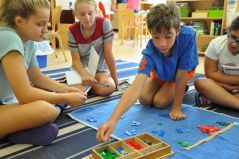Work at home versus homework: What your Elementary child can do nightly to support their growing independence.
September 5th, 2018
 As a Montessori Elementary Guide, I am often pressed on the topic of homework. There is an understandable anxiety among some parents regarding the lack of assigned homework, fearing that this will cause their child to fall egregiously behind traditional school students in academic performance.
As a Montessori Elementary Guide, I am often pressed on the topic of homework. There is an understandable anxiety among some parents regarding the lack of assigned homework, fearing that this will cause their child to fall egregiously behind traditional school students in academic performance.
Therefore, it is imperative that we address this common misconception of “more homework = greater success,” especially given the lack of evidence to support a much too simplistic formula. After all, a synthesis of educational research done between 1987 and 2003 found that the mean correlation, for elementary school students, between time spent on homework and achievement was not significantly different from zero. (Cooper, Robinson, & Patall, 2006).
It is important, though, to distinguish between homework as a teacher-directed assignment versus work done at home in order to develop the whole human being. In conjunction with Dr. Maria Montessori’s original approach, we highly encourage the latter. This type of work is driven by the child’s natural inclinations to gain value as a member of his or her society.
 Elementary children will naturally, and with vigor, explore their interests outside of the home without having to be prompted. For example, one of my students felt compelled to finish a report on Mars, at home, in order to free up his time in the classroom for other types of work. This student worked on writing, grammar, astronomy, math, geography, reading, and PowerPoint skills at home. Yet another student of mine constructed his own Nerf gun, from scratch, out of materials collected from around his home. As a result, he utilized math, science, and engineering skills. What’s even better - he was engaged with the work of his hands and saw himself create without anyone asking him to do so.
Elementary children will naturally, and with vigor, explore their interests outside of the home without having to be prompted. For example, one of my students felt compelled to finish a report on Mars, at home, in order to free up his time in the classroom for other types of work. This student worked on writing, grammar, astronomy, math, geography, reading, and PowerPoint skills at home. Yet another student of mine constructed his own Nerf gun, from scratch, out of materials collected from around his home. As a result, he utilized math, science, and engineering skills. What’s even better - he was engaged with the work of his hands and saw himself create without anyone asking him to do so.
As educators, we bear witness to the positive effects of this type of work, because it is the type of work that spills over into the classroom, the type that the children excitedly report to us when they return to school the next day. As parents, simply provide the means by which your child can carry out such explorations at home - especially as extensions of the work they do in the classroom. This may be something as simple as setting aside 30 minutes for reading before bed every night - a book that has been chosen by your child, based on the interests of your child, at a level appropriate for your child. Perhaps it may be eliciting your child’s help in constructing a calendar to keep track of his or her extracurricular activities, so as to practice time management skills. Each time your family goes grocery shopping or eats a meal out, is an opportunity to engage your child in developing financial skills. Have your child create a budget for the groceries or calculate the 20% tip for the bill at a restaurant. Give your child the opportunity to help create a meal by allowing him or her to measure out the ingredients and calculate any adjustments in the recipe that need to be made.
In concentrating on high quality, purposeful tasks in this way, the child “gradually becomes more open and acquires more and more confidence in himself. “ He or she “becomes conscious of his own value.” (Creative Development in the Child, 1994). After all, isn’t that what we all want for our children?
Written By Sarah McCabe, MSGH Elementary Guide














